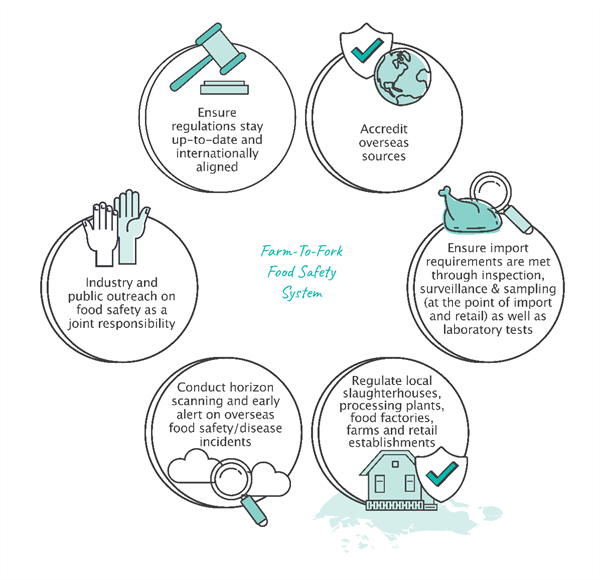The Singapore Food Agency (SFA) publishes food safety statistics biannually (in January and June) to improve the public’s understanding of SFA’s risk-based, farm-to-fork approach to protecting public health.
Singapore imports over 90% of our food. The volume of food arriving on our shores every day is large. The food can be contaminated anywhere along the supply chain. Therefore, not every single food item in the market can be inspected and tested. Food safety authorities around the world face this challenge.
SFA, as the national authority for food safety, adopts a risk-based approach to food safety. It is guided by a science-based risk assessment and management approach that is consistent with international standards. This means food of higher risks are subjected to more stringent checks.
SFA has in place an integrated food safety system from farm-to-fork to ensure that food is safe for consumption. This comprises control measures along the food supply such as accreditation of overseas sources of food of higher risks (e.g. meat, eggs), licensing of local food establishments, inspections, and testing.

At the Point of Import
Imported fruits and vegetables, livestock (poultry and pigs), eggs, meat, and seafood, and processed foods are inspected and sampled at the point of import. Samples are collected during these inspections to ensure the food meet our regulatory standards, which include microbiological, pesticides, drug residues, preservatives, contaminants, and additives. For food products that fail our tests, SFA follows up with the importers, including rejecting the affected consignments and requiring importers to rectify the issue with their suppliers from overseas.
Food that are illegally imported pose a food safety risk. Offenders who illegally import food are liable on conviction to a maximum fine of $50,000 and/or imprisonment for a term not exceeding two years.
Local Regulation of Food Establishments
For food produced, manufactured, and sold locally, SFA licenses and inspects the premises to ensure compliance with our food safety regulations. As part of SFA’s surveillance program, samples are also randomly taken for a range of food safety tests. SFA follows up on any food safety infringements, including taking enforcement action and requiring operators to rectify the lapses.
Gastroenteritis Incidents
Gastroenteritis is a condition characterised by the inflammation of the stomach and intestines. Common symptoms of gastroenteritis include diarrhoea or vomiting, depending on whether it is caused by bacteria/bacterial toxins or viruses. While pathogens can be transmitted through food, viruses such as Norovirus can also be transmitted from person to person, or via environmental surfaces, especially as a result of improper personal hygiene. SFA would investigate reported gastroenteritis incidents, together with other agencies such as MOH and PUB, and assess whether the incidents were linked to a food establishment or not.
Food Recalls
When we detect a breach of food safety or requirements in food products, SFA could take measures such as:
- Investigation on the cause of contamination and advising on measures to prevent recurrence of the incident.
- Immediate recall of the affected food from the retail outlets and food establishments.
SFA works closely with the food companies, relevant agencies, and our overseas counterparts in the recall of food products and tracing the affected batches.
Consumers Have a Role To Play
Food can potentially be contaminated through improper practices from the time it is produced to the time it is consumed. Food safety requires the joint effort of the Government, food industry, and consumers.
Consumers have an important role to play in ensuring food safety as they have direct control over the food they buy, handle, prepare, and consume. To make a more informed choice when deciding which food establishment to patronise or engage, look for track records (grading, number of demerit points and suspension history) of the food establishment on go.gov.sg/sfa-food-retail-licence.
In addition, consumers should equip themselves with knowledge of food safety risks and good food safety practices. These SFA resources will be useful:
Lastly, consumers who come across any errant food operator should report to SFA via the online feedback form (https://csp.sfa.gov.sg/feedback).